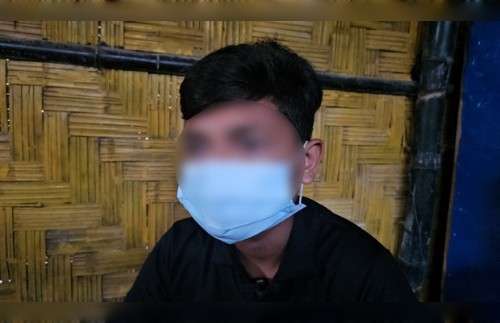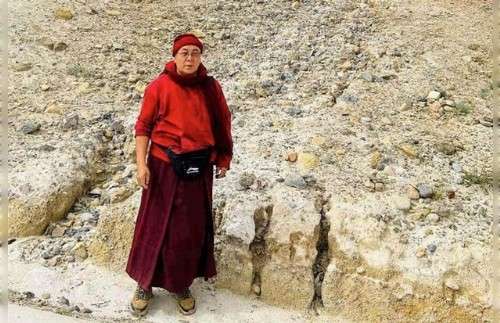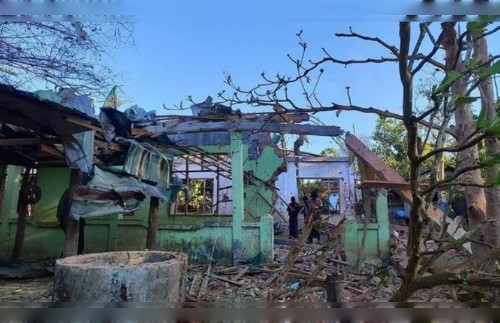US Secretary of State Antony Blinken has videoconference with Uyghurs previously detained in internment camps.

Uyghur groups around the world have held demonstrations commemorating a violent crackdown on Uyghurs by Chinese authorities 12 years ago in the capital of the Xinjiang Uyghur Autonomous Region (XUAR), while the top U.S. diplomat has discussed the deepening repression of the largely Muslim ethnic minority group in northwestern China.
More than 200 Uyghurs, including many young people who came to the U.S as children, held an anti-China protest in Washington, D.C., marking the anniversary of the violent unrest in Urumqi (in Chinese, Wulumuqi). Demonstrators in the U.S. capital held both American flags and the light blue flags of East Turkestan, the Uyghur name for China’s Xinjiang region.
Some 200 people died and 1,700 were injured in the three-day rampage of violence that began on July 5, 2009, between ethnic minority Uyghurs and Han Chinese in Urumqi, according to China’s official figures, although Uyghur rights groups say the numbers are much higher.
The Uyghur Japanese Association held a protest in Shinjuku, a central ward in Tokyo, with the participation of not only Uyghurs living in Japan, but also Japanese citizens, Mongolians, and Hong Kongers.
The Germany-based World Uyghur Congress held a protest on July 5 in London, where Uyghur community members, Tibetans, and representatives from Hong Kong also participated in the event.
The Uyghur community in Switzerland held a protest in Bern, while Uyghurs based in Turkey commemorated the 2009 incident by holding 10 events in Istanbul, Ankara, Konya, and other cities.
Leaders of Uyghur organizations, members of the Uyghur diaspora, and Turkish supporters held a protest and press conference in front of Chinese Consulate in Istanbul on July 5, attended by thousands of people.
Uyghurs in Munich and Amsterdam also organized demonstrations in front of the Chinese embassies in these cities.
Uyghurs in Kazakhstan and Kyrgyzstan gathered in mosques, halls, and cafés because they were not allowed to demonstrate, while diaspora members in Bishkek, capital of Kyrgyzstan, held a meeting to commemorate the 12-year anniversary of July 5 unrest.
Only about 50 Uyghurs were allowed to attend the meeting organized by the Uyghur Association “Ittipaq” of Kyrgyzstan because of COVID-19 safety protocols limiting the number of people who can gather in public.

Blinken holds roundtable
On Tuesday, U.S. Secretary of State Antony Blinken met via videoconference with seven Uyghur internment camp survivors, advocates, and relatives of people detained in the XUAR to hear directly from them about abuses against the minority group.
The camps are believed by experts to have handled as many as 1.8 million people – roughly one-sixth of the XUAR’s 12 million Uyghurs – since 2017.
China says the camps are vocational training facilities set up to combat religious extremism and terrorism. But many teachers, intellectuals and prominent businessmen have been incarcerated in the system.
Blinken told the Uyghurs that that U.S. was committed to working with allies and partners in calling for an end to China’s ongoing crimes against humanity and genocide, according to a statement issued by State Department spokesman Ned Price.
“The United States will continue to place human rights at the forefront of our China policy and will always support the voices of activists, survivors, and family members of victims who courageously speak out against these atrocities,” the statement said.
Anders Corr, publisher of the Journal of Political Risk and principal at the political risk mitigation firm Corr Analytics Inc., said that Blinken’s meeting with former internment camp detainees was an encouraging sign.
“It means that he is taking the genocide increasingly seriously,” he said. “Let’s hope he next brings these meetings and the suffering of the Uyghurs into the public to demonstrate yet greater American commitment to their liberation.”
Sophie Richardson, China director of Human Rights Watch, said Blinken’s decision to meet with the group of Uyghurs was “an incredibly important thing to do.”
Hearing their stories and soliciting their idea were “not just an important gesture of support for those individuals and their community, but also a very powerful way of putting China on notice that the U.S. government has no intention of dialing back its concerns about this issue,” she said.
Richardson also stressed the importance of putting in place mechanisms for investigations and accountability for Chinese government officials responsible for crimes against humanity to deter China from similar action in the future.
The U.S. State Department determined in January that the Chinese government is perpetrating genocide against Uyghurs in the XUAR, citing internment camps that have held some 1.8 million people, some of whom have been tortured or subjected to other abuse.
The U.S. and several other countries have imposed sanctions on Chinese officials responsible for abuses against Uyghurs, as well as on Chinese government agencies and companies suspected of using Uyghur forced labor to make products such as cotton, wigs, tomatoes, and polysilicon for solar panels.
In Beijing on Wednesday, China’s Foreign Ministry spokesman Wang Wenbin said the chief issue in the XUAR is combating terrorism, when asked about Blinken’s meeting with Uyghurs previously detained in the camps.
“As we’ve stressed time and again, issues relating to Xinjiang are not about ethnicity, religion or human rights, but about fighting violent terrorism, extremism and separatism,” he told a news conference. “The crimes of ‘abuse,’ ‘atrocity,’ or ‘genocide’ can never be attributed to China.”
“U.S. lies and rumors have been exposed by the fact and truth that Xinjiang enjoys stability and prosperity and residents there are leading happy and fulfilling lives,” Weng said, repeating Beijing’s stock response since the well-documented internment camp system came to light in 2017.
“The U.S. attempt to use human rights as a cover to mess up Xinjiang and contain China’s development will never succeed.”
Reported and translated by RFA’s Uygur Service. Written in English by Roseanne Gerin.
Copyright © 1998-2020, RFA. Used with the permission of Radio Free Asia, 2025 M St. NW, Suite 300, Washington DC 20036. https://www.rfa.org


















